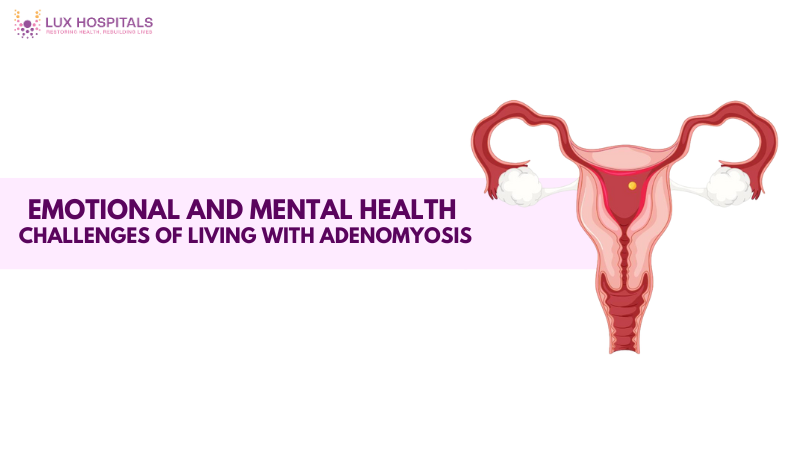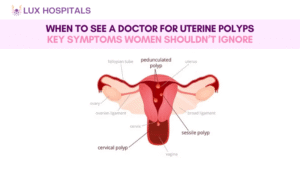Emotional and Mental Health Challenges of Living with Adenomyosis

Living with adenomyosis can be emotionally and cognitively exhausting. While its bodily manifestations, including fatigue, pelvic pain, and heavy menstruation, are often recognised, the invisible difficulties are also significant. The unpredictable symptoms and persistent discomfort can make day-to-day living emotionally and physically exhausting. Stress, anxiety, and the emotional toll of adenomyosis can have a substantial influence on one’s quality of life. Let’s look at the effects of this illness.
Understanding Adenomyosis
Adenomyosis is a gynaecological phenomenon in which the endometrium, the uterus’s inner lining, develops into the muscle wall. This leads to an enlarged uterus, which results in severe cramping, heavy bleeding, and chronic pain.
Common Symptoms of Adenomyosis
- Severe menstrual cramps
- Heavy or prolonged periods
- Chronic pelvic pain
- Bloating and fatigue
- Pain during intercourse
These symptoms often cause women to feel frustrated and misunderstood, which can affect their mental health, employment, and social lives.
The Emotional Toll of Chronic Pain
Having adenomyosis frequently entails having persistent pelvic pain. Irritability, irritation, and even melancholy can result from persistent discomfort. Emotional burnout can result from ongoing discomfort, making it difficult to concentrate on daily tasks or interact with others.
How Pain Affects Mental Health
- Reduced patience and mood swings: Pain makes emotional regulation difficult.
- Social withdrawal: People often isolate themselves to avoid explaining their condition.
- Sleep disturbances: Pain can interfere with rest, worsening anxiety and fatigue.
When your body hurts regularly, your mind begins to carry the burden too.
Anxiety and Depression Linked to Adenomyosis
The unpredictable nature of adenomyosis can cause anxiety — especially around menstrual cycles or social events. Many women worry about when their next flare-up may happen because they feel confined in their bodies. This uncertainty frequently brings on anxiety, and depression may result when it is coupled with chronic pain.
Why Mental Health Suffers?
- The fear of public bleeding incidents.
- The frustration of medical misdiagnosis or delayed treatment.
- Emotional fatigue from repeatedly explaining the condition.
Acknowledging these feelings is the first step toward emotional healing.
Impact on Self-Esteem and Body Image
Adenomyosis can cause women to feel disconnected from their bodies. The bloating, weight swings, and exhaustion may affect how they see themselves. When physical problems occur or interfere with intimacy, feelings of inadequacy or humiliation may surface.
Building Positive Self-Image
- Practice self-compassion and body acceptance.
- Engage in gentle exercises or yoga to reconnect with your body and mind.
- Dress comfortably so that you feel relaxed and confident.
Relationship Challenges
Managing adenomyosis can strain relationships. Fatigue and chronic pain can make it harder to be intimate, which can cause miscommunications between partners. Many women worry that their illness will be disregarded or condemned.
Ways to Strengthen Relationships
- Open communication: Let your lover know how you feel.
- Educate them: Help them understand adenomyosis and its associated symptoms and effects.
- Plan rest days together: Bond through supportive and relaxing activities.
Emotional connection often deepens when partners learn to navigate challenges together.
The Role of Hormonal Imbalance in Mood Changes
Adenomyosis-induced hormonal changes might make mood swings, impatience, and emotional distress worse. Anxiety and depression symptoms are frequently exacerbated by estrogen and progesterone abnormalities during menstruation.
Managing Hormonal Mood Swings
- Track your mood and cycle patterns.
- Consult your doctor for hormonal therapy options.
- Maintain a balanced diet and reduce caffeine intake.
Awareness of hormonal patterns can help women prepare mentally and emotionally for their cycles.
Coping Mechanisms for Emotional Wellness
Managing adenomyosis involves both mental and physical support. Adopting everyday coping strategies that support the restoration of equilibrium and positivity is part of managing mental health.
Effective Strategies
- Mindfulness and meditation: Calm your mind and reduce stress.
- Counselling or therapy: Talking to a professional can ease anxiety and depression.
- Support Groups: Connect with other women who live with adenomyosis.
Self-care is not indulgent — it’s essential for maintaining mental strength.
Lifestyle Modifications to Support Mental Health
Simple lifestyle habits can significantly enhance your ability to manage adenomyosis symptoms and emotional challenges.
Practical Tips
- Eat an anti-inflammatory diet rich in vegetables, omega-3s, and whole grains.
- Remain active; even modest exercise generates endorphins.
- Continue your regular sleep schedule.
- Limit stress by practising relaxation techniques such as deep breathing or journaling.
Seeking Professional Support
Support for mental health is just as important as medical care. Psychologists, therapists, and counsellors can help women navigate the emotional rollercoaster that comes with adenomyosis. It is a sign of strength, not weakness, to ask for help.
When to Seek Help?
- Persistent sadness or sorrow
- Loss of interest in daily activities
- Difficulty coping with pain or anxiety
Early intervention can prevent long-term emotional exhaustion.
Medical Treatment and Its Emotional Benefits
Medically treating adenomyosis can also enhance mental health. A sense of normalcy can be restored with the help of hormone therapy, pain management programs, or surgery (such as a hysterectomy).
Emotional Relief Through Treatment
When pain subsides, mood improves, confidence returns, and daily activities become manageable again. Combining medical care with mental health therapy offers the best recovery path.
How Family and Friends Can Help?
Having a supportive circle can make a huge difference for someone living with adenomyosis. During trying circumstances, loved ones can provide both practical and emotional support.
Ways to Offer Support
- Listen without judgment.
- Offer help with chores during flare-ups.
- Encourage seeking professional care.
Empathy and understanding go a long way in improving emotional resilience.
Conclusion
Adenomyosis presents mental and emotional health issues that are just as important as its physical ones. There are serious repercussions, such as anxiety, despair, and problems with one’s self-perception. However, despite this, a fulfilling life can be achieved with awareness, self-care, medical treatment, and emotional support. At Lux Hospitals, we understand the emotional and physical suffering caused by adenomyosis and are committed to providing compassionate care and effective treatment. Please remember that assistance is always available and that you are not alone.
Frequently Asked Questions
Yes, because of the hormonal imbalance and chronic discomfort, adenomyosis can cause mood swings and sadness. The aggravation of persistent symptoms can exacerbate mental stress and have an impact on emotional well-being.
It can make everyday tasks challenging by causing weariness, discomfort, and mental anguish. The unpredictable nature of symptoms makes it difficult for many women to concentrate at work or sustain social interactions.
Yes, many women with adenomyosis experience anxiety related to pain, heavy bleeding, and loss of control over their physiques. Anxiety might be exacerbated by the ongoing stress of managing the illness.
Restoring total well-being can be achieved by reducing physical and emotional symptoms through regular exercise, stress-reduction strategies, a healthy diet, and enough sleep.
Yes, therapy can be beneficial. A professional can provide coping strategies, emotional validation, and support to help you manage the psychological effects of adenomyosis.






















